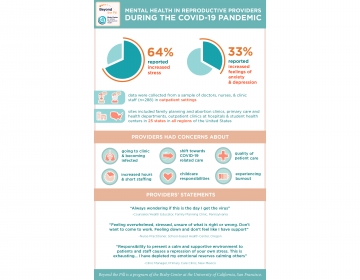Beyond the Pill research finds that outpatient reproductive health providers are experiencing significant stress, anxiety, and depression during the COVID-19 pandemic
Beyond the Pill's research brings awareness to the urgent need to ensure that providers across the entire health system, including outpatient settings, have the resources and support to cope with the mental health consequences of providing health care during the COVID-19 pandemic.

There has rightly been attention on the pandemic’s impact among front-line health workers in emergency rooms and hospital settings. We wanted to explore the mental health consequences of the pandemic among outpatient providers. Our latest research published in the journal Reproductive Health is the first national qualitative study among outpatient providers assessing how providing care during the pandemic has affected their mental health.
We found that two-thirds of respondents reported increased stress and one-third reported increased anxiety or depression during the pandemic. A Clinic Manager from New Mexico explained:
“[The] responsibility to present a calm and supportive environment to patients and staff causes a repression of your own stress. This is exhausting... I have depleted my emotional reserves calming others.” A Counselor from Pennsylvania said: “Always wondering if this is the day that I get the virus,” while a Clinic Manager from Montana wrote “The unknown always causes anxiety. When will our operations go back to normal? Will there be another spike and will we have to close again?”
The main factors that contributed to increased stress, anxiety and depression included providers’ concerns about the quality of patient care, increased clinical responsibilities, lack of PPE, challenges in coping with co-workers illness’ and even death, and worries about unemployment and childcare responsibilities. Providers also mentioned feeling overwhelmed, being unable to focus, lacking sleep and worrying about the unknown.
This study points to the crucial need to ensure that providers across the whole health system have access to mental health services. As mentioned in our recent Op-Ed, interventions need to focus on reducing stigma as a barrier to health providers accessing treatment for mental illness and creating better systems for identifying early warning signs of anxiety, depression, and post-traumatic stress disorder. These health providers have been a critical resource during the pandemic, but attention needs to be focused on ensuring that they too access the necessary care even as the pandemic subsides.


